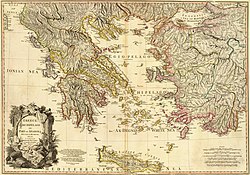Names of the Greeks
| History of Greece |
|---|
 |
|
|
The Greeks (Greek: Έλληνες) have been identified by many ethnonyms. The most common native ethnonym is Hellen (Ancient Greek: Ἕλλην), pl. Hellenes (Ἕλληνες); the name Greeks (Latin: Graeci) was used by the ancient Romans and gradually entered the European languages through its use in Latin. The mythological patriarch Hellen is the named progenitor of the Greek peoples; his descendants the Aeolians, Dorians, Achaeans and Ionians correspond to the main Greek tribes and to the main dialects spoken in Greece and Asia Minor (Anatolia).
The first Greek-speaking people, called Myceneans or Mycenean-Achaeans by historians, entered present-day Greece sometime in the Neolithic era or the Bronze Age. Homer refers to "Achaeans" as the dominant tribe during the Trojan War period usually dated to the 12th–11th centuries BC,[1][2] using Hellenes to describe a relatively small tribe in Thessaly. The Dorians, an important Greek-speaking group, appeared roughly at that time. According to the Greek tradition, the Graeci (Latin; Ancient Greek: Γραικοί, Graikoi, "Greeks") were renamed Hellenes probably with the establishment of the Great Amphictyonic League after the Trojan War.
When the Romans first encountered Greek colonists in southern Italy, they used the name Graeci for the colonists and then for all Greeks; this became the root of all relevant terms in European languages. The Persians used the name Yaunas[citation needed] (Yunans) after the Ionians, a Greek tribe who colonized part of the coasts of western Asia Minor. The term was used later in Hebrew (Yevanim, יוונים), Arabic, and also by the Turks. The word entered the languages of the Indian subcontinent as the Yona. A unique form is used in Georgian, where the Greeks are called Berdzeni (ბერძენი).
By Late Antiquity (c. 3rd–7th century), the Greeks referred to themselves as Graikoi (Γραικοί, "Greeks") and Rhomaioi/Romioi (Ῥωμαῖοι/Ῥωμηοί/Ρωμιοί, "Romans") the latter of which was used since virtually all Greeks were Roman citizens after 212 AD. The term Hellene became applied to the followers of the polytheistic ("pagan") religion after the establishment of Christianity by Theodosius I.
General names of Greece[]
Most European languages, as well as other languages that have borrowed the name from one of them, use names for Greece that come from the Latin Graecia and Graecus, the name the Romans used for the Greeks, itself from the Greek Γραικός:
- Afrikaans: Griekeland
- Albanian: Greqia
- Aromanian: Gãrtsia
- Belarusian: Грэцыя (Hrecyja)
- Bulgarian: Гърция (Gǎrcija); the alternative historical name Елада (Elada) for ancient Greece is also used sometimes.
- Bosnian: Grčka
- Catalan: Grècia
- Chechen: Греци (Gretsi)
- Cherokee: ᎪᎢᎯ (Goihi)
- Czech: Řecko
- Welsh: Groeg
- Danish: Grækenland
- Dutch: Griekenland
- Esperanto: Grekujo
- German: Griechenland
- Greek: Γραικία (rare or obsolete use)
- English: Greece
- Spanish: Grecia
- Estonian: Kreeka
- Basque: Grezia
- Finnish: Kreikka
- Filipino: Gresiya
- French: Grèce
- West Frisian: Grikelân
- Irish: An Ghréig
- Croatian: Grčka
- Hungarian: Görögország
- Icelandic: Grikkland
- Italian: Grecia
- Japanese: ギリシャ (Girisha)
- Khmer: ក្រិច (Krech)
- Korean: 그리스 (Geuriseu)
- Cornish: Pow Grek
- Lithuanian: Graikija
- Latvian: Grieķija
- Macedonian: Грција (Grcija)
- Maltese: Greċja
- Nahuatl languages: Grecia
- Polish: Grecja
- Portuguese: Grécia
- Romanian: Grecia
- Russian: Греция (Grecija)
- Serbo-Croatian: Grčka / Грчка
- Sinhala: ග්රීසිය (Grisiya)
- Slovak: Grécko
- Slovene: Grčija
- Somali: Giriiga
- Serbian: Грчка / Grčka
- Swedish: Grekland
- Thai: กรีซ (Krīt)
- Ukrainian: Греція (Hrecija)
In languages of Middle East and South and Central Asia, the common root is "yun" or "ywn". It is borrowed from the Greek name Ionia, a once Greek region of Asia Minor, and the Ionians:[3]
- Arabic: يونان (Yūnān)
- Aramaic: ܝܘܢ or יון (Yawān, Yawon)
- Armenian: Հունաստան (Hunastan)
- Old Armenian: Յունաստան (Yunastan)
- Azerbaijani: Yunanıstan
- Hindi: यूनान (Yūnān)
- Biblical Hebrew: יָוָן (Yāwān)
- Hebrew: יוון (Yavan)
- Indonesian: Yunani
- Malay: Yunani
- Kurdish: Yewnanistan
- Nepalese: यूनान (Yūnān)
- Urdu: یونانی (Yūnān)
- Persian: یونان (Yūnān)
- Old Persian: